
Geochemical Perspectives Letters
Scope & Guideline
Illuminating the intersections of chemistry and geology.
Introduction
Aims and Scopes
- Isotope Geochemistry:
Investigates the distribution and fractionation of isotopes to understand geological processes, including the origins and evolution of Earth and other celestial bodies. - Elemental Analysis:
Focuses on the composition and behavior of elements, particularly in volcanic, sedimentary, and hydrothermal environments, to elucidate their roles in geochemical cycles. - Planetary Geochemistry:
Explores geochemical processes on other planetary bodies, including meteorites and celestial samples, to enhance understanding of planetary formation and evolution. - Microbial Geochemistry:
Examines the interactions between microbial life and geochemical processes, particularly in biogeochemical cycles and the formation of minerals. - High-Pressure and High-Temperature Studies:
Utilizes experimental approaches to simulate conditions found deep within Earth and planetary interiors, providing insights into mineral stability and fluid behavior. - Environmental Geochemistry:
Assesses the geochemical signatures of natural systems and anthropogenic effects on soil, water, and air quality, contributing to the understanding of environmental changes.
Trending and Emerging
- Advanced Isotope Techniques:
There is a growing emphasis on innovative isotopic techniques and multi-isotope studies, which provide deeper insights into complex geological and biological processes. - Impact Geochemistry:
Research related to the geochemical effects of planetary impacts, including studies on tektites and impact melt processes, is gaining traction, reflecting interest in cosmic events and their terrestrial implications. - Microbial Influence in Geochemistry:
An increasing number of studies focus on the role of microbial activity in geochemical processes, particularly in mineral formation and nutrient cycling, indicating a trend towards biogeochemical interactions. - High-Temperature and High-Pressure Geochemistry:
Emerging research on geochemical processes under extreme conditions is expanding, driven by advancements in experimental techniques and the need to understand deep Earth processes. - Climate Change and Geochemical Cycles:
Investigations into the effects of climate change on geochemical cycles, including carbon and nutrient cycling, are becoming more prominent, reflecting the urgency of understanding anthropogenic impacts.
Declining or Waning
- Historical Geochemistry:
Research focused on ancient geochemical processes and events has seen a decline, potentially as newer methodologies and technologies allow for more immediate and relevant studies. - Traditional Mineralogy:
Papers centered on conventional mineralogical studies, especially those lacking a geochemical perspective, appear to be less frequent, as the field increasingly integrates interdisciplinary approaches. - Simple Isotope Studies:
Basic studies of single isotope systems without comprehensive analysis or context have decreased, possibly due to a shift towards more complex multi-isotope investigations.
Similar Journals

Journal of Geosciences
Unveiling the Secrets of Our Planet, One Study at a TimeJournal of Geosciences is a distinguished peer-reviewed journal published by CESKA GEOLOGICKA SPOLECNOST, based in the Czech Republic, that serves as a vital platform for the dissemination of innovative research in the field of Earth and Planetary Sciences. With an ISSN of 1802-6222 and E-ISSN of 1803-1943, this journal has established its significance within the academic community, evidenced by its Q3 ranking in both Earth and Planetary Sciences and Geology. The journal covers a broad array of topics, making it an essential resource for researchers, professionals, and students interested in geoscientific advancements and discoveries. The Journal of Geosciences reflects a commitment to high-quality scholarship, embracing a variety of methodologies and interdisciplinary approaches, and provides open access to its content, thereby encouraging global collaboration and knowledge sharing among geoscientists. With a publication history converging from 2007 to 2024, it continues to be a prominent venue for critical conversations and developments in the ever-evolving field of geosciences.
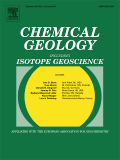
CHEMICAL GEOLOGY
Pioneering Discoveries in Geochemistry and PetrologyChemical Geology is an esteemed international journal published by Elsevier, dedicated to the rigorous exploration of geochemistry and petrology, with its foundational roots tracing back to 1966. As evidenced by its impressive Q1 ranking in both Geochemistry and Petrology as well as Geology in the 2023 category quartiles, this journal stands as a premier outlet for cutting-edge research and innovative methodologies within these vital fields. With a Scopus rank placing it in the top 10% of Earth and Planetary Sciences, Chemical Geology offers a platform for researchers, professionals, and students alike to disseminate findings that advance our understanding of geological processes and materials. Although it does not currently offer open-access options, the journal remains committed to high-quality publications that contribute significantly to the scholarly community. Located in the vibrant academic milieu of Amsterdam, Netherlands, Chemical Geology is an essential resource for those engaged in the earth sciences, aiming to bridge theoretical insights with practical applications.
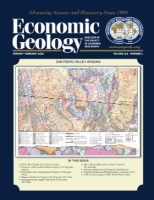
ECONOMIC GEOLOGY
Exploring the Depths of Economic GeologyECONOMIC GEOLOGY, published by the Society of Economic Geologists, Inc., is a premier journal dedicated to the field of economic geology, geochemistry, petrology, geology, and geophysics. With a significant legacy dating back to 1905 and converging into 2024, this journal has established itself as a leading source of research and knowledge in the geosciences, recognized for its high-quality, peer-reviewed articles that reflect the latest advancements in the discipline. Having achieved an impressive impact factor and categorized in the top Q1 quartiles, it ranks among the foremost journals in various related fields, including Earth and Planetary Sciences—where it particularly excels in geophysics (Rank #5) and geochemistry (Rank #6). Although it currently does not offer open access options, its rigorous publication standards ensure that the research disseminated significantly contributes to the understanding and exploration of geological resources. This journal is essential reading for researchers, professionals, and students who seek to deepen their knowledge and stay at the forefront of economic geology.
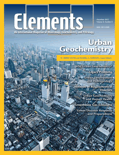
Elements
Connecting Scholars through Groundbreaking ResearchElements is a premier academic journal published by the Mineralogical Society of America, dedicated to advancing knowledge in the fields of Earth and Planetary Sciences and Geochemistry and Petrology. Since its inception in 1973, this journal has established itself as a leading source of impactful research, evidenced by its prestigious Q1 rankings in both categories in 2023, placing it among the top journals globally with Scopus ranks of #18 and #23, respectively. Elements is uniquely positioned to foster interdisciplinary dialogue, offering a platform for groundbreaking studies that explore the fundamental processes shaping our planet. Although it operates without an open access model, its rigorous peer review process guarantees the integrity and quality of published work, making it an essential resource for researchers, professionals, and students eager to stay abreast of the latest developments in mineralogy and earth sciences. With a commitment to excellence, Elements continues to push the boundaries of our understanding of geological phenomena and their implications for both science and society.
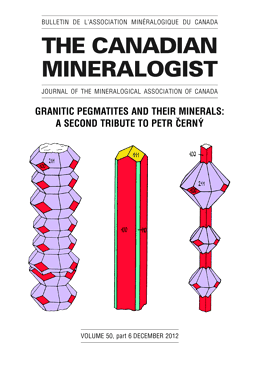
CANADIAN MINERALOGIST
Fostering Scholarly Excellence in Mineral ResearchCANADIAN MINERALOGIST is a prestigious academic journal published by the Mineralogical Association of Canada, primarily focusing on the fields of Geochemistry and Petrology. Established in 1980, this journal has fostered a rich tradition of scholarly communication, offering a platform for researchers from around the world to share significant advancements and findings related to mineral science. With an impact factor that reflects its relevance within the scientific community, the journal occupies a notable position, ranked in the Q3 quartile within its category according to the 2023 assessments. The E-ISSN 1499-1276 ensures that online access is readily available, making it easier for readers to engage with cutting-edge research. With its headquarters in Quebec, Canada, CANADIAN MINERALOGIST not only contributes to the academic landscape in North America but also plays a vital role globally in advancing the understanding of mineralogy. Its commitment to high-quality publishing supports both the dissemination of knowledge and the nurturing of a vibrant scientific community.
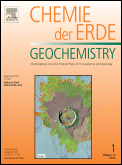
Geochemistry
Advancing Knowledge in Geochemical ProcessesGeochemistry is a distinguished academic journal published by Elsevier GmbH, focusing on the intricate study of geochemical processes across earth systems. With its ISSN 0009-2819 and E-ISSN 1611-5864, this journal serves as a crucial platform for scholars and researchers eager to disseminate their latest findings in geochemistry, petrology, and geophysics. The journal has established itself within the scientific community, achieving a Q2 ranking in both Geochemistry and Petrology as well as Geophysics, showcasing its significant impact and relevance—ranking 18th out of 165 in Geophysics and 26th out of 154 in Geochemistry and Petrology according to Scopus. From its inception in 1978 to its ongoing contributions through 2024, Geochemistry remains a vital resource for academic discourse and innovation in earth sciences. As an open-access title, it allows for broader dissemination of knowledge, promoting accessibility for researchers, students, and professionals. Whether you are engaged in theoretical research or applied studies, Geochemistry provides the insights necessary to advance our understanding of the planet's chemical complexity.

Periodico di Mineralogia
Fostering Excellence in Earth Science ResearchPeriodico di Mineralogia, published by SAPIENZA UNIV EDITRICE, is a distinguished academic journal based in Italy that has been pivotal in advancing the fields of Geochemistry, Geology, and Geophysics since its inception in 1979. With an ISSN of 0369-8963 and an E-ISSN of 2239-1002, the journal boasts a solid reputation reflected in its Q3 category rankings across these disciplines as per 2023 metrics. The journal’s scope encompasses a broad range of topics related to mineralogy and earth sciences, providing a vital platform for researchers, professionals, and students to disseminate their findings. Despite the absence of an Open Access option, Periodico di Mineralogia remains an essential resource for the dissemination of high-quality research that contributes to our understanding of earth processes and materials. Situated in the heart of Rome at PIAZZALE ALDO MORO 5, it serves as a crucial bridge between academic research and practical applications in geology and planetary sciences.
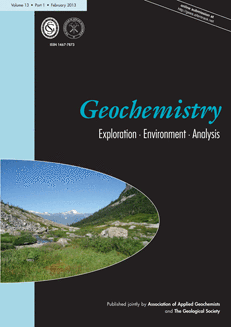
GEOCHEMISTRY-EXPLORATION ENVIRONMENT ANALYSIS
Elevating discourse in Earth and planetary sciences.GEOCHEMISTRY-EXPLORATION ENVIRONMENT ANALYSIS, published by the esteemed Geological Society Publishing House, is a leading journal in the fields of geochemistry, environmental science, and Earth and planetary sciences. With an ISSN of 1467-7873 and E-ISSN of 2041-4943, this journal has established itself as a valuable resource for scholars and professionals since its inception in 2001. The journal currently holds a Q3 quartile ranking in several categories, highlighting its relevance and impact within interdisciplinary research landscapes. Covering a broad scope of topics ranging from geochemical explorations to environmental assessments, GEOCHEMISTRY-EXPLORATION ENVIRONMENT ANALYSIS serves as a platform for innovative research and critical analysis, contributing significantly to advancing knowledge in the context of ongoing global environmental challenges. Researchers looking for a credible outlet to disseminate their findings will find this journal particularly appealing, as it encourages submissions that explore novel methodologies and interdisciplinary approaches. Although the journal follows a subscription-based access model, it provides valuable insights that can enhance academic discourse and foster collaboration among experts in the field.

ACTA PETROLOGICA SINICA
Unveiling the Secrets of Petrological PhenomenaACTA PETROLOGICA SINICA, published by SCIENCE PRESS, is a distinguished journal in the field of geochemistry and petrology, known for its commitment to advancing the understanding of Earth's materials and processes. With an impact factor ranking it in the second quartile (Q2) of its category and a respectable Scopus rank of 64 out of 154, this journal serves as a vital platform for researchers, professionals, and students alike, facilitating the dissemination of innovative studies and findings from 1980 to the present. Its robust editorial board and diverse array of articles make it an invaluable resource for those engaged in the intricate analysis of petrological phenomena and geochemical transformations. Published in China, ACTA PETROLOGICA SINICA provides access to significant original research, reviews, and insights essential for advancing knowledge and fostering collaboration in the earth sciences.

PETROLOGY
Exploring the Intricacies of Mineral CompositionsPETROLOGY is a significant journal in the field of Geochemistry and Petrology, published by PLEIADES PUBLISHING INC in the United States. With an ISSN of 0869-5911 and an E-ISSN of 1556-2085, this journal has established itself as a valuable resource since its inception in 1996, continuing to provide insights into various aspects of petrology and geochemical processes through to 2024. It holds a Q3 ranking in the 2023 category quartiles for Geochemistry and Petrology, placing it within the academically relevant tier of journals as recognized by Scopus. Although it does not currently offer open access, the journal remains accessible to researchers, professionals, and students eager to explore the intricate relationships between mineral compositions and geological phenomena. By publishing high-quality research and reviews, PETROLOGY plays a crucial role in advancing knowledge, contesting existing paradigms, and fostering discussions on both fundamental and applied topics within the petrology domain.